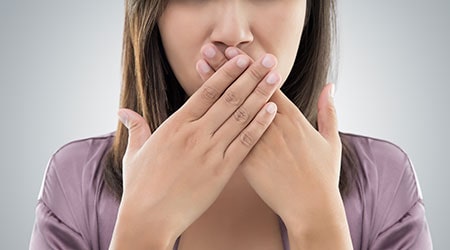Bad Breath (Halitosis) in Salinas, CA
What Is Halitosis?
Halitosis is simply the medical term for bad breath and the conditions that cause it.

Halitosis comes from food and air
Certain foods and drinks may trigger halitosis, and it’s important to take note of them if you find yourself frequently experiencing bad breath. Onions and garlic are the classic offenders, but other foods that are rich in flavors and aromas may lead to stale breath as well. This can be anything from peppers, starchy potatoes, and even meats. The salts and starches in these foods may dry out your mouth leading to halitosis soon after the meal. Tobacco and alcohol can also quickly dry out the mouth leading to unfavorable odors.
To prevent this, make sure to drink water soon after eating. This will help you to hydrate while also preventing bacterias from settling in your mouth. Flossing right after a meal can also help to get any leftover pieces of food out of your teeth before bad breath occurs.
Sometimes bad breath occurs from the air that you exhale, and this can be from anything including a respiratory infection to the nasal drip that lines the back of your throat. While you will need a doctor to treat most of these complications, gargling mouthwash can work wonders by eliminating any foul odors found on the back of your throat.
A Dry Mouth Can Be Fixed
-
What is dry mouth?
A dry mouth generally occurs when you remain dehydrated, but sometimes it is due to other issues outside of simple hydration. While dry mouths often result in halitosis, they can also lead to other severe problems such as gingivitis and an increased risk of cavities. Luckily, there are numerous at-home treatments that we can provide you to help keep away dry mouth and bad breath!
-
How can you prevent halitosis?
The best way to prevent halitosis is by following a good oral hygiene regimen including flossing, brushing, and possibly a mouthwash. Avoiding sugary sweets can also help to prevent plaque buildup and possible odors. While gums and mints may help for a few moments, they will work against you by introducing more sugars and acids into your mouth. If you find yourself frequently reaching for gum, talk to us today to see how we can help cure your halitosis!
-
At-home care is important.
You can take great care of your teeth at home. By doing so, you will increase the likelihood of keeping your teeth strong, white, and healthy for life. Proper brushing techniques and daily flossing can drastically reduce your chances for cavities and more severe actions such as tooth extraction. Flossing works to disrupt the bacteria between the teeth and along the gum line to ensure that cavities don’t form and that your gums don’t become irritated. If your gums become irritated, they may turn red and begin to recede which can result in tooth loss.
Brushing helps by removing sticky plaque from your teeth. Not only does this make them whiter and shinier, but it helps to prevent the plaque from hardening and forming cavities. To get the best benefits, use a proper brushing technique by angling the soft bristles towards your gum line and going in small circular movements. Don’t brush too hard, and make sure that you spend equal time on each tooth and on both sides of the tooth as well.
-
What are the benefits of brushing?
Brushing after a meal and before going to bed will help to remove plaque, reduce your chances of cavities, maintain gum health, and keep your teeth white. Removing plaque is especially important as plaque contains many acids that lead to decay and discoloration. By using a fluoride toothpaste while brushing, your teeth will also be able to remineralize which helps them to become stronger and more resistant to cavities.
It’s also important to use a soft toothbrush so that you don’t accidentally harm the enamel surface of your teeth. A toothbrush should be changed every few months to prevent bacteria from settling and to reduce frayed brushes. Remember to brush softly and in a circular motion for the best results!
-
what are the benefits of flossing?
Flossing removes plaque from the areas that your brush can’t reach. By doing so, you will prevent plaque formation between the teeth and deep along the gum line. This will prevent cavities, gum problems, and bad breath from forming.
Flossing may at first seem intimidating, and it’s important to ask your dentists any questions or concerns you may have regarding the process. When you first begin flossing, you may notice some initial slight bleeding. This is nothing to be alarmed about, and the bleeding should cease after a few days of regular flossing. However, consistent bleeding or any pain should be brought to the attention of your dentist immediately. Remember to floss gently and in a controlled manner for the best results!
-
Are mouthwashes worthwhile?
Mouthwashes can be beneficial although they are not as important as flossing and brushing. It’s important to use a mouthwash without alcohol to avoid drying or harming the soft tissues of your mouth. Some mouthwashes contain fluoride while others contain a variety of vitamins or minerals to help aid remineralization. Some prescribed mouthwashes contain large amounts of fluoride to help remineralize teeth for patients at risk of cavities. Talk to your Salinas dentist to see if your mouthwash is right for you.
The employees at TLC dentistry are friendly and knowledgeable. They make you feel comfortable and confident that you are receiving the best treatment available. I highly recommend them.
Teresa L., Actual Patient
Prevent Bad Breath
We’re easy to find!
750 East Romie Lane, Suite C
Salinas, CA 93901
